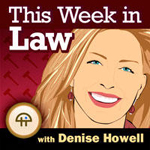You are currently browsing the tag archive for the ‘internet’ tag.
By Justin Silverman
Do computers have a First Amendment right to free speech?
Tim Wu, author and law professor at Columbia University, posed and attempted to answer this question in a June op-ed in The New York Times. (Admittedly, I’m a bit late to come across the piece, but I think it’s still very relevant and well-worth revisiting.) On its face, the question seems absurd — the constitution protects individuals, not machines! — but the issue has been debated since at least 2003 when Google argued in a civil suit that its search results were protected speech. The court ruled in Google’s favor.
Explained Wu:
“In today’s world, we have delegated many of our daily decisions to computers. On the drive to work, a GPS device suggests the best route; at your desk, Microsoft Word guesses at your misspellings, and Facebook recommends new friends. In the past few years, the suggestion has been made that when computers make such choices they are ‘speaking,’ and enjoy the protections of the First Amendment. This is a bad idea that threatens the government’s ability to oversee companies and protect consumers.”
In arguing that the output of a computer is too attenuated from the individual to warrant full First Amendment protection, Wu criticized professor Eugene Volokh of the University of California, Los Angeles School of Law. Volokh declared in a paper that “Google, Microsoft’s Bing, Yahoo! Search, and other search engines are speakers.”
Volokh defended his position in a thorough rebuke to Wu, resulting in a great exchange between the two highly regarded academics on a controversy that could potentially redefine the limits of the First Amendment. Do yourself a favor and read both pieces in their entirety. The depth of the arguments, particularly those of Volokh, is beyond the means of this brief blog post.
In short, Volokh explained that:
“…the computer algorithms that produce search engine output are written by humans. Humans are the ones who decide how the algorithm should predict the likely usefulness of a Web page to the user. These human editorial judgments are responsible for producing the speech displayed by a search engine. For instance, Google’s use of the volume of links from other sites as a criterion for ranking search results was itself the result of Google engineers’ editorial judgment that inbound links provided a sound and quantifiable measure of a site’s value. Search engine results are thus the speech of the corporation, much as the speech created or selected by corporate newspaper employees is the speech of the newspaper corporation.”
To many, this debate has real consequences. Since I wrote about the prevalence of mugshot websites, for example, I’ve had many conversations with readers who question why their mugshot is the first search result when there are many other websites that portray them in a more flattering light. It’s unfair, they argue. Google’s decision to rank these mugshot sites higher than others is making their professional growth difficult and tarnishing their image sometimes decades after an arrest. Can’t this type of “speech” be regulated?
Well, it seems, it depends on who you ask.
Justin graduated from Suffolk University Law School in 2011 and served as founding president of Suffolk Media Law. He is currently an attorney based in Westborough, Mass. In addition to Suffolk Media Law, he blogs for the Citizen Media Law Project and the New England First Amendment Center, for which he serves as a board member. You can contact him through his website, JustinSilverman.com, and follow him on Twitter at @justinsilverman.
(Image of “Computer Parts Thingy” courtesy Flickr user kokopelli1330 and published under a Creative Commons BY-NC license.)




Recent Comments